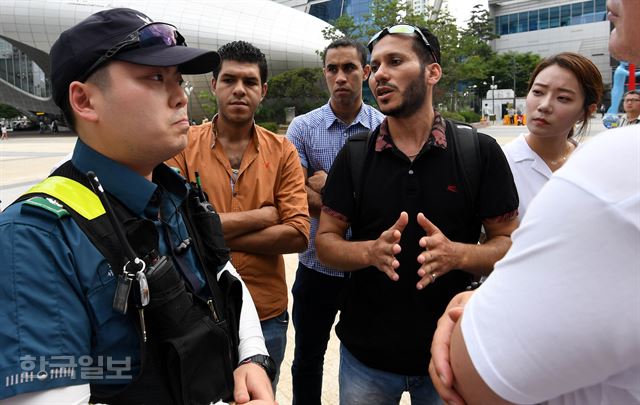
A comedic drama on MBC TV once again showed/ the nation’s general lack of sensitivity/ toward other religions and cultures.
최근 MBC에서 방영되고 있는 코미디 드라마가 또 한 번 보여주었다/ 한국 사회의 몰이해를/ 타 종교와 문화에 대한
This drama mocks Islam but there are other precedents that make fun of black people, belittle other Asians and disparage Caucasians/ for their religions, skin colors and different behavior.
이 드라마 뿐 만 아니라 기존의 다른 TV 프로그램들에서도 흑인을 조롱하거나 다른 아시아인을 폄하하고, 백인을 폄하한 사례가 여럿 발생했다/ 종교나 피부색, 다른 행동 방식 등을 이유로
Korea is an economic power in its own right and/ takes pride in being a global cultural leader.
한국은 이미 경제 강국이며/ 세계 문화를 선도하는 리더로서의 긍지를 갖추고 있다
If so,/ it is time to get to know more about people from other lands and/ respect their differences.
그렇다면/ 이제는 다른 국가의 민족에 대해 좀 더 알아가고/ 그들의 차이점을 존중해야 한다
Besides, it is a matter not of choice but of necessity/ for a nation that is racially diversifying.
이는 비단 선택의 문제가 아닌 필수의 문제다/ 인종이 점점 다양화되고 있는 나라에서
Korea/ is home to 140,000 Muslims and 35,000 converted Koreans.
한국에는/ 14만 명의 이슬람 사람들과 3만 5천 명의 귀화 한국인들이 있다
“Man who dies to live”/ is a popular twice-a-week drama/ about the campy behavior of a man/ who became rich in an Islamic country he went to in the 1970s.
문제의 프로그램인 ‘죽어야 사는 남자’는/ 일주일에 2회 방영되는 인기 드라마로/ 주인공의 과장된 행동을 다룬다/ 1970년대 중동에서 엄청난 부를 축적한
It made a series of “mistakes”/ that were offensive to Muslims.
이 드라마에는 ‘실수’들이 여럿 등장한다/ 이슬람 교도라면 불쾌하게 느낄 수 있는
First,/ its promotional poster/ shows the main character in Arabic attire/ putting his feet on the table next to an open copy of the Koran.
우선/ 프로그램 홍보 포스터는/ 아랍 복장을 한 주인공의 모습을 담고 있다/ 코란 옆에 발을 올려 놓은
In one episode,/ there are two women in bikinis/ lying on beach loungers with traditional Islamic headscarves for women, hijab.
한 에피소드에는/ 비키니를 입은 두 명의 여성들이 등장한다/ 이슬람의 전통 여성 스카프인 히잡을 쓰고 해변 라운저에 누워 있는
안성진 코리아타임스 어학연구소 책임연구원
기사 URL이 복사되었습니다.

댓글0